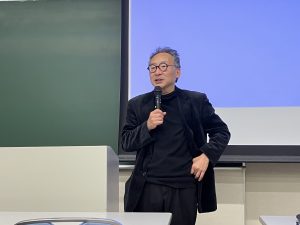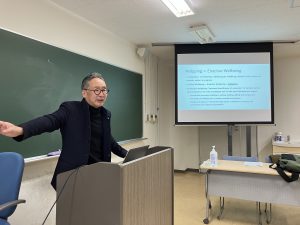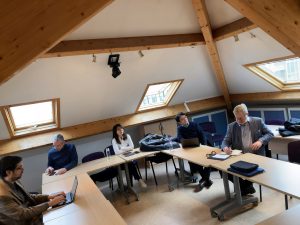Date: 13th., April.
Place: Kyoto University, Yoshida Campus, Research Bldg. No 2, Seminar Room No. 10 (#34 on the map: https://www.kyoto-u.ac.jp/en/access/main-campus-map).
Schedule:
1. Onishi & Deguchi: 13:00-14:00 Logic of Presence
2. Arana & Akiyoshi: 14:00-15:00 Intuition in Kant, Fichte and Nishida
3. van Atten: 15:10-16:10 The role of the subject in a constructive, but non-recursive function
4. Kim: 16:10-17:10 A Topological Analysis of Ur-Ich and Pre-Subjectivity in Knot Set Theory
5. Taguchi: 17:20-18:20 Primal Subjectivity as Mediation. From a Phenomenological, Enactive, and Tanabean Perspective
Organizers: Mark van Atten (Archives Husserl, CNRS), Hye Young Kim (Associate member of the Archives Husserl, ENS), Ryota Akiyoshi (Keio Global Research Institute), Andrew Arana (Université de Lorraine, Archives Poincaré), & Yasuo Deguchi (Kyoto University).
――――――――――――――――――――――――――――――――――――――
Abstracts:
Onishi & Deguchi: Logic of Presence
In this presentation, we introduce a new modal concept called ‘presence’ and propose its logic. The primary application of the concept of presence is virtual reality. After critically examining David Chalmers’ “Reality+” and Marie-Laure Ryan’s philosophy of fiction, we introduce the idea of presence as mutual intentionality. That is, an agent b is present to an agent a when a bears a mutual intentionality relation with b. Furthermore, we present the logic of mutual intentionality based on Graham Priest’s modal Meinongian theory of intentionality and the logic of common knowledge in the field of epistemic logic.
Arana & Akiyoshi: Intuition in Kant, Fichte and Nishida
In this talk we will compare intuition according to Kant, Fichte and Nishida. We will discuss Kant’s passive and receptive conception of intuition; Fichte’s intellectual intuition; and Nishida’s active intuition. We will then observe how the three mathematical avatars of these philosophers, Hilbert, Brouwer and Takeuti, respectively, brought these conceptions of intuition to bear on mathematical knowledge.
van Atten: The role of the subject in a constructive, but non-recursive function
The Dutch mathematician and philosopher L.E.J. Brouwer (1881–1966) developed a foundation for mathematics called `intuitionism’. Intuitionism sees mathematics as acts of mental construction based on internal time awareness. According to Brouwer, that awareness provides the fundamental structure to all exact thinking. In this note, it will be shown how the self-reflexive awareness that the subject has of this allows for the construction of an intuitionistic function that is non-recursive.
Kim: Ur-Ich, Pre-Subjectivity, Shared-Consciousness
This presentation starts from exploring the concept of Ur-Ich (primal I) by Husserl in the framework of Shigeru Taguchi’s analysis. From there I want to revisit the understanding of self, based on my idea of pre-subjectivity. Both in Ur-Ich and pre-subjective self, there exists a structure of paradox which is that it is both self and other, or it is neither one nor many. As one way of resolving this paradox, I apply knot set theory by Louis Kauffman.
Taguchi: Pre-subjectivity as Mediation. From a Phenomenological, Enactive, and Tanabean Perspective
It is an implausible assumption to regard the ego as entirely detached from other egos. While it maintains independence as an individual, this does not preclude its relationality with others; indeed, it may even be mediated by them. This is made intelligible through Tanabe Hajime’s concept of “mediation” as ‘connecting by cutting.’ In my presentation, I will explore what enables us to be ‘individual egos’ within Tanabe’s theoretical framework, drawing on phenomenology and the enactive approach as well. This exploration leads to a consideration of primal subjectivity (Ursubjektivität), a form of subjectivity that transcends mere individuality. Hye Young Kim’s work We as Self (2021) seems to explore such a dimension of subjectivity using the term “pre-subjectivity.” In my talk, I will develop a dialogue with her book to examine how her interpretation of “pre-subjectivity” is similar to my understanding of primal subjectivity. In my understanding, we should reject the idea that there exists an overarching entity from which individual ego emerges as a ‘result’ or ‘product.’ Instead, I will claim that ‘being an individual is precisely being beyond the individual.’ This concept entails an elusive structure that cannot be simplified into mere three-dimensional configurations but rather involves twisting and intertwining. There is no substantial ‘greater ego,’ nor does a detached ‘we’ exist apart from the ego. The existence of ‘I’ mediates the existence of ‘we,’ and vice versa. This ‘mediation’ as a disjunctive conjunction of different dimensions is exactly what I understand as ‘primal subjectivity,’ which I argue is both the core of the ego and the core of ‘we.’






